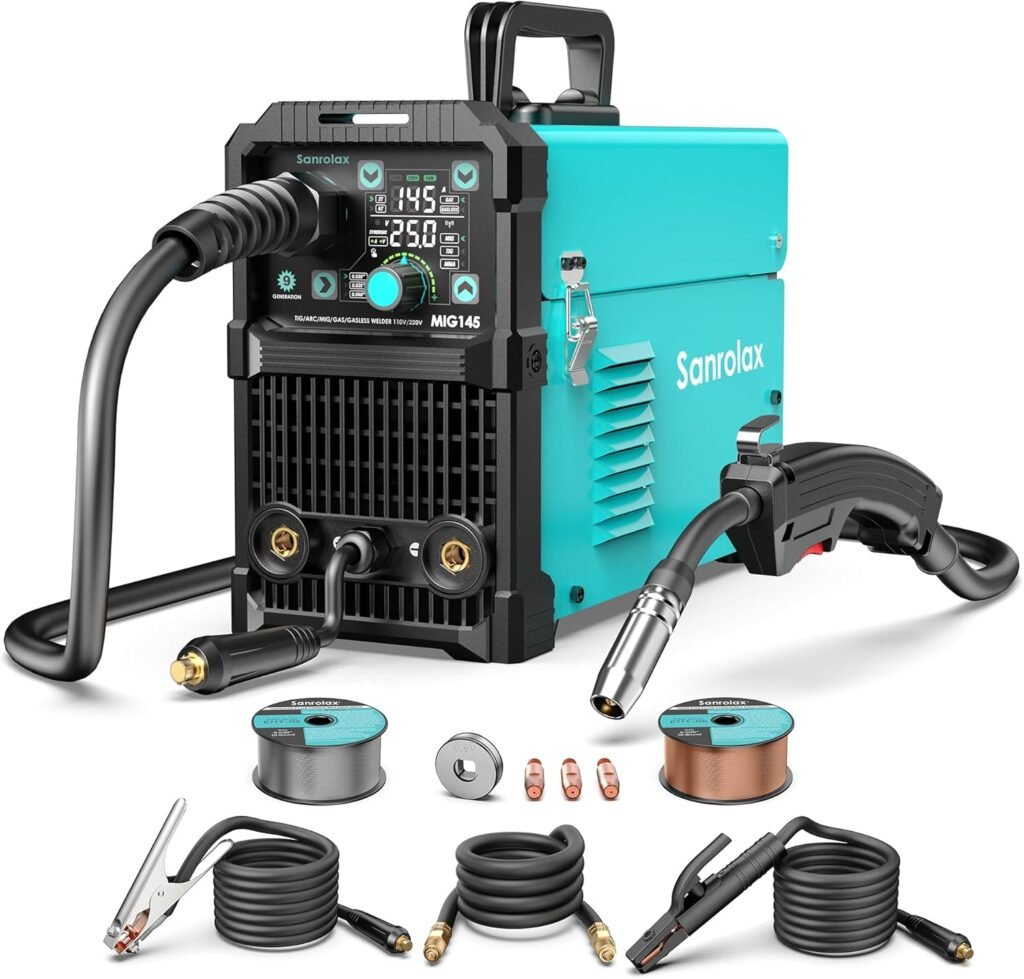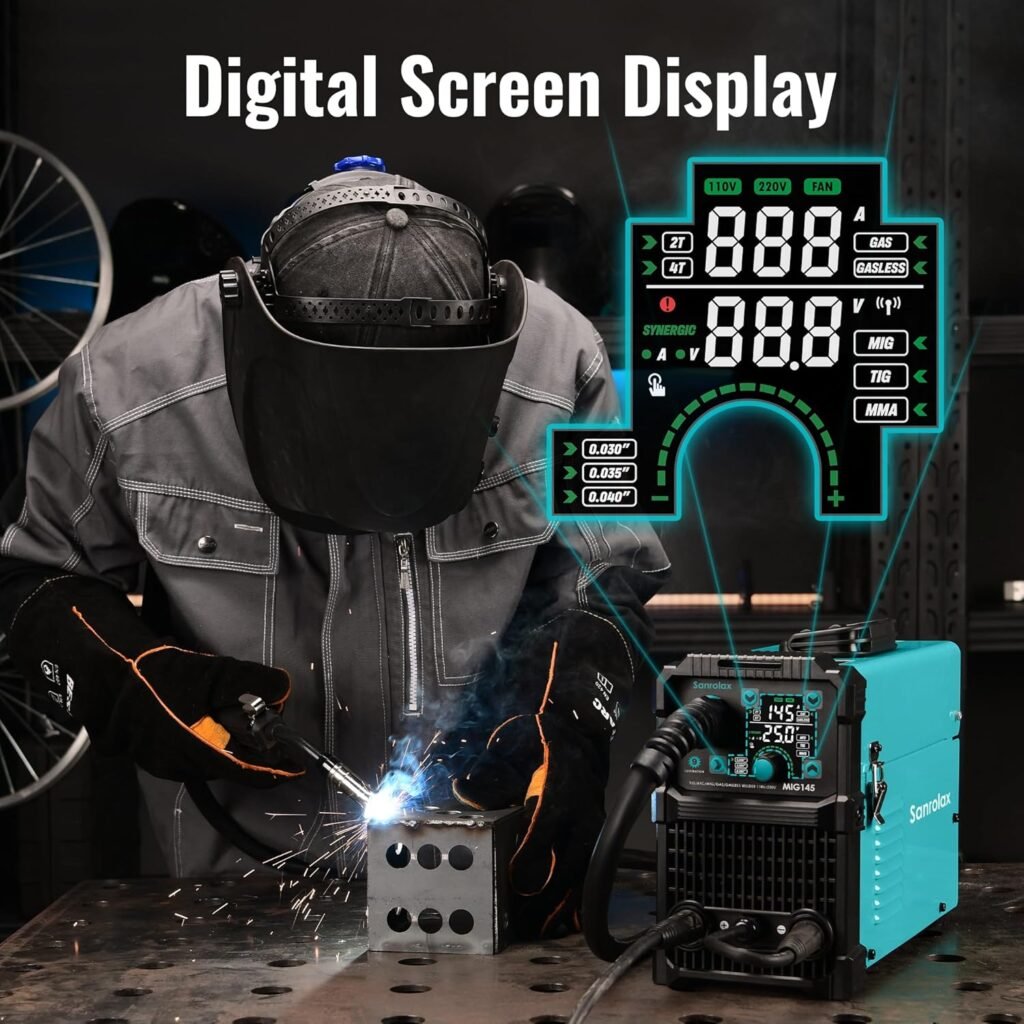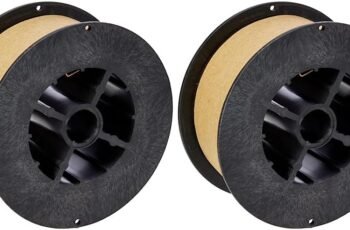Ad Blocker Detected
Our website is made possible by displaying online advertisements to our visitors. Please consider supporting us by disabling your ad blocker.
? Are you trying to decide whether the 145A MIG Welder, 110/220V Dual Voltage Flux/Solid Core MIG Welder/Lift TIG/Stick 3 in 1 MIG Welding Machine, MIG145 9GEN Synergy Flux IGBT Welder Digital Screen Display is the right buy for your projects?
Quick overview of what this machine is and who it’s for
You’ll find the 145A MIG Welder is a compact, multi-function machine built to handle gasless flux core MIG, lift TIG (torch not included), and stick welding. If you want something portable that can handle light to medium duty welding on carbon steel, stainless steel, and thicker materials without investing in several machines, this device aims to meet those needs.
What you get in the box
You’ll receive the MIG145 unit, a MIG torch, earth clamp, stick holder, a spool of 0.040″ flux-cored wire, several contact tips, wire feed rollers, a shoulder strap, and a user manual. The essential consumables and connectors are included so you can get welding quickly after basic setup.
Package contents explained
The included consumables save you a trip to the store for the most common items you’ll need to begin welding. The lift TIG torch is not included, so you’ll need to source that separately if you plan to TIG frequently.
Key specifications at a glance
You’ll find the main specs here in an easy-to-read layout so you can quickly compare against other machines or confirm suitability for your projects.
| Specification | Details |
|---|---|
| Model | 145A MIG Welder (MIG145 9GEN Synergy Flux IGBT) |
| Welding Modes | Gasless Flux Core MIG, Lift TIG (torch not included), Stick |
| Max Current | 145 A |
| Voltage | 110/220V Dual Voltage (auto-detect) |
| Wire Sizes Supported | 0.030″, 0.035″, 0.040″ |
| Torch Length | 6.5 ft |
| Weight | ~13 lbs |
| Display | LED digital screen (voltage, current, parameters) |
| Technology | IGBT, integrated wire feed, synergic control |
| Included | MIG torch, earth clamp, stick holder, flux-cored wire, contact tips, wire feed rollers, shoulder strap, manual |
Design and build quality
The unit is compact and lightweight, making it straightforward to carry and use outdoors. You’ll appreciate that the shoulder strap and 13-pound weight make transportation easy for mobile work or moving between garage and job site.
Chassis and durability
The case is built from typical sheet metal and plastic components used in compact inverters; it’s durable enough for hobbyists and light professional use. You should handle it with reasonable care — it isn’t an industrial, all-day-every-day behemoth, but it should hold up well with routine maintenance and normal job site use.
Digital screen and user interface
You’ll like the LED digital screen because it displays voltage, current, and other parameters in real time, so you don’t need to lift your helmet to check settings. The clear readout and front-panel indicators simplify monitoring and adjustments while welding.
Synergic control and adjustments
The synergic function automatically matches recommended voltage and wire feed speed for selected wire sizes and thickness, which helps you get usable settings faster. You can also tweak voltage ±3V manually with the adjustment knob, giving you the flexibility to fine-tune your welds whether you’re inexperienced or experienced.
Power and input flexibility
The automatic 110/220V dual-voltage detection is a strong convenience feature for DIYers and contractors who move between job sites with different power availability. This flexibility means you won’t need a heavy transformer or dedicated 220V outlet every time you want to weld thicker material.
Performance on 110V vs 220V
On 110V you’ll be limited to lower maximum output and may need thinner material or multiple passes for thicker joints. When you switch to 220V, you unlock closer to the 145A capability, allowing deeper penetration and cleaner welds on thicker stock. You’ll need to be realistic about throughput on household circuits.
Welding modes — what to expect
The 3-in-1 capability is the main selling point: gasless flux-core MIG, Lift TIG, and stick welding give you versatility for different materials and conditions. If you focus primarily on one process, this machine still gives you the option to experiment or handle other tasks without buying a second machine.
Gasless flux-cored MIG welding
You’ll find flux-core welding great for outdoor work and jobs where shielding gas is impractical. The machine supports common flux-cored wire diameters and gives decent arc stability for carbon steel and stainless in many applications.
Lift TIG capability
Lift TIG lets you start TIG arcs without high-frequency start systems, useful when you want cleaner TIG-style welds on thin materials. Because the lift TIG torch is not included, you will need to purchase a compatible torch and set up argon gas if you want to TIG weld properly.
Stick welding
Stick mode provides versatility for maintenance, repair, and outdoor welds where flux or gas is less convenient. You’ll appreciate the IGBT inverter technology that helps keep stick arcs stable within the current range.
Wire feed and consumables
The integrated wire feed mechanism and included rollers for 0.030″/0.035″ are convenient for getting started. You’ll benefit from the included contact tips and flux-cored spool so you can begin welding without sourcing many parts immediately.
Wire compatibility and changeover
Changing wire sizes and rollers is straightforward, and the machine supports the common 0.030″, 0.035″, and 0.040″ flux-cored wires. You should keep spare contact tips and rollers for the wire diameters you use most to minimize downtime.
Portability and ergonomics
Weighing about 13 pounds and with a shoulder strap, this welder is very portable compared to traditional MIG setups. You’ll find it easy to carry between locations and maneuver for small projects or on-farm repairs.
Torch reach and cable management
The included 6.5 ft torch gives a fair amount of reach for typical bench and small-site jobs. You’ll want to organize cabling and secure the torch for prolonged use, but most users will find the length adequate.
Setup and first-time use
You’ll be able to set the machine up in a short time if you’re comfortable with basic welding machine installation: fit the spool, load the wire, connect the ground clamp, and adjust the wire feed tension. The digital display and synergic functions reduce guesswork for initial settings.
Steps for initial setup
- Mount the wire spool and feed it through the drive rollers.
- Select the appropriate wire feed rollers for your wire diameter and install them.
- Install the contact tip to match the wire diameter.
- Connect the ground clamp and power on.
- Use the synergic mode to set base values, then fine-tune voltage ±3V as necessary.
Welding quality and real-world performance
You’ll notice acceptable bead appearance and penetration for hobby and light professional work when set up correctly. The synergic control and digital readout help you achieve repeatable results without extensive trial and error.
Typical materials and thicknesses
Expect good results on sheet metal, medium-thickness steel, and stainless in flux-core MIG mode, especially on material ranges consistent with 145A limitations. For thicker structural work, you’ll likely need multiple passes or a higher-output machine.
Advantages for beginners and hobbyists
The machine’s synergic controls, digital readout, and included consumables make it especially friendly for beginners. You’ll be able to learn faster because the machine helps you find reasonable starting parameters and shows them clearly.
Learning curve and safety
While the MIG145 simplifies many things, you still need to learn welding basics and safety protocols like shielding gas use for TIG, proper PPE, and how to manage spatter and warpage. Once you understand arc length, travel speed, and wire feed relationship, you’ll get consistent results.
Pros and cons summary
You’ll find a quick pros and cons list helpful to see the trade-offs at a glance before committing to a purchase.
Pros
- Portable and lightweight for job site mobility.
- 3-in-1 capability adds versatility without buying separate machines.
- Dual voltage (110/220V) auto-detect for flexible power use.
- Digital screen and synergic control simplify setup and adjustments.
- Includes consumables to get started quickly.
Cons
- Lift TIG torch is not included, so TIG requires an extra purchase.
- 145A max output limits heavy industrial fabrication on thick steel.
- Not suited for continuous high-duty cycles in heavy production environments.
- Flux core is gasless but typically produces more spatter and slag than gas-shielded MIG.
Safety features and recommended PPE
You should always wear appropriate PPE: a properly rated welding helmet, leather gloves, flame-resistant clothing, and a respirator if welding materials that release dangerous fumes. The machine does not replace safe practices or a proper ventilation setup.
Electrical safety and grounding
You’ll want to ensure proper grounding, correct outlet wiring for 110V/220V input, and that extension cords (if used) are rated for the current and length to avoid voltage drop. The unit’s auto-voltage detection helps prevent damage from wrong inputs, but safe wiring remains your responsibility.
Maintenance and long-term care
You should keep the drive roll, contact tip, and liner clean and change them as they wear to maintain performance. Periodically inspect cables, connections, and venting to prevent overheating, and store the machine in a dry location when not in use.
Troubleshooting common issues
If the wire keeps birdnesting, check feed tension, liner cleanliness, and spool orientation. If arcs are unstable, verify ground connection, wire diameter, and correct contact tip; also check the display for any error indicators and consult the manual.
Who should buy this machine
You should consider this unit if you are a DIY enthusiast, hobbyist, auto restorer, farmer, or light fabrication shop looking for a budget-friendly, portable welder with multiple welding modes. It’s great for occasional professional tasks where portability and flexibility matter.
Who should not buy this machine
You shouldn’t pick this if you need high-duty-cycle industrial welding, continuous heavy fabrication, or a full TIG setup for high-precision aluminum TIG without spending more on torches and gas systems. In those cases, a larger, dedicated machine is better.
Comparisons to other machines in the same class
Compared to single-process cheap welders, the MIG145’s 3-in-1 capability and digital controls offer more versatility and ease of use. Against higher-end machines, it lags in duty cycle, maximum current, and potentially long-term durability under heavy loads.
Value for money
You’ll likely find good value for money if portability, a combined feature set, and the included accessories are important to you. It’s an economical option for multi-process capability in a small form factor.
Use-case scenarios and project types
If you work on car body panels, lawn equipment repair, small farm jobs, DIY metal furniture, or light fabrication, this machine will meet most of your needs. You’ll achieve efficient and consistent welds in environments where gas shielding is impractical thanks to flux core capability.
Example projects you can tackle
You’ll be able to repair trailer frames, weld brackets, fabricate gates and railings, and perform small engine mount repairs. For thin sheet metal, you’ll likely need to fine-tune wire feed and travel speed to avoid burn-through.
Accessories and upgrades to consider
You should buy a lift TIG torch if you plan to TIG weld and an argon tank for proper TIG shielding. Additional wire spools in the diameters you use most, extra contact tips, replacement rollers, and a quality welding helmet will make your work easier and safer.
Recommended consumables to have on hand
Keep extra contact tips for each wire diameter, spare drive rolls, replacement liners, anti-spatter spray, and a supply of flux-cored wire for jobs you commonly perform. These basic items reduce downtime and keep your workflow smooth.
Practical tips to get the best results
You should clean and prep metal before welding, maintain correct travel speed, and use the synergic presets as your baseline. Don’t be afraid to fine-tune voltage small amounts to get the bead profile you want.
Tips for minimizing spatter and warpage
Use shorter weld cycles, clamp workpieces securely, and control heat input by adjusting travel speed and voltage. Keeping a consistent arc length and using the correct wire and tip size also reduces spatter.
Common questions answered
You’ll likely wonder about duty cycle, consumable compatibility, and how to TIG without the included torch. This unit’s duty cycle is suitable for intermittent welding tasks, the consumables follow common diameters, and TIG requires purchasing a compatible lift TIG torch and gas setup.
Typical troubleshooting Q&A
If your wire keeps jamming, check spool tension and feed roller alignment. If the arc is weak, confirm correct voltage selection, proper ground, and that the wire spool is seated and turning freely.
Warranty and support expectations
You should check the seller’s warranty and support options; compact inverters typically include limited warranties and rely on dealer or manufacturer support for repairs. Keep your purchase receipt and serial number handy for warranty claims.
When to contact support
You’ll contact support if you see error codes you can’t clear, if the unit fails to power on, or if there’s a suspected electrical fault or major component failure. Small wear items like tips and rollers are generally not covered under warranty.
Final verdict and recommendation
You should consider the 145A MIG Welder if you value portability, multi-process capability, and a digital synergic interface at a relatively affordable price. It’s a practical choice for hobbyists, light fabricators, and mobile repair work where weight and flexibility matter.
Bottom-line guidance
If you want a single, portable machine that lets you do basic MIG, lift TIG, and stick welding without carrying multiple devices, this is a solid contender. If you require heavy industrial throughput or a full TIG package out of the box, plan to invest more in a dedicated system.
Frequently asked questions (FAQ)
You’ll find answers to the most common concerns below so you can quickly determine fit for your needs.
Can you TIG weld aluminum with this unit?
You can’t TIG weld aluminum without a proper TIG torch, AC capability (this unit is DC), and argon gas; even then, DC-only machines aren’t ideal for aluminum, which typically needs AC TIG. For aluminum, consider a dedicated AC TIG machine.
Does the machine need a separate gas tank for MIG welding?
No, the flux-core MIG capability is gasless, so you can weld without a shielding gas. If you plan to use solid wire MIG, you would need an external gas setup, and that setup isn’t optimized as a primary use here.
How long is the torch cable and is it replaceable?
The included MIG torch is about 6.5 ft long, which is adequate for most small jobs. Torch replacement parts are usually available from the manufacturer or third-party suppliers if needed.
Is the unit suitable for automotive work?
Yes, for many repair tasks like welding brackets, patch panels, and other sheet metal work, you’ll find it useful. For precision bodywork, practice and careful control of heat input will help avoid warpage.
Closing note on using the machine safely and effectively
You should always wear the correct PPE, ensure ventilation, and follow the user manual for wire loading, maintenance, and safe operation. With proper care and realistic expectations about output, this 3-in-1 welder can become a versatile and dependable addition to your toolset.
Disclosure: As an Amazon Associate, I earn from qualifying purchases.







